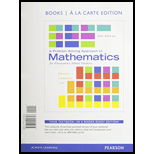
Concept explainers
Use the approach in Gauss’s Problem to find the following sums of arithmetic sequences ( do not use formulas):
a.
b.
c.
d.
Want to see the full answer?
Check out a sample textbook solution
Chapter 1 Solutions
A Problem Solving Approach to Mathematics for Elementary School Teachers, Books a la Carte Edition plus NEW MyLab Math with Pearson eText - Access Card Package (12th Edition)
- The graph of f(x) is given in the figure below. draw tangent lines to the graph at x=-3,x=-2,x=1,and x=4. estimate f'(-3),f'(-2),f'(1),and f'(4). Round your answers to one decimal place.arrow_forwardConsider the functions f(x)=4x-1 and g(x)=sq root of -x+7. Determine 1. f o g(x) 2. Give the domain of f o g(x) 3. g o f (x) 4. Give the domain of g o f(x)arrow_forward12. lim h→0 √5x+5h -√5x h where x>0 is constaarrow_forward
- If f(x)=x2+4, g(x)=x-6, h(x)=sq root of x, then (f o g o h)(x)=arrow_forwardIf f(x)=x2+4, g(x)=x-6, h(x)=sq root of x, then (f o g o h)(x)=arrow_forwardYou are given a plane Π in R3 defined by two vectors, p1 and p2, and a subspace W in R3 spanned by twovectors, w1 and w2. Your task is to project the plane Π onto the subspace W.First, answer the question of what the projection matrix is that projects onto the subspace W and how toapply it to find the desired projection. Second, approach the task in a different way by using the Gram-Schmidtmethod to find an orthonormal basis for subspace W, before then using the resulting basis vectors for theprojection. Last, compare the results obtained from both methodsarrow_forward


 College Algebra (MindTap Course List)AlgebraISBN:9781305652231Author:R. David Gustafson, Jeff HughesPublisher:Cengage Learning
College Algebra (MindTap Course List)AlgebraISBN:9781305652231Author:R. David Gustafson, Jeff HughesPublisher:Cengage Learning
 Algebra for College StudentsAlgebraISBN:9781285195780Author:Jerome E. Kaufmann, Karen L. SchwittersPublisher:Cengage Learning
Algebra for College StudentsAlgebraISBN:9781285195780Author:Jerome E. Kaufmann, Karen L. SchwittersPublisher:Cengage Learning Glencoe Algebra 1, Student Edition, 9780079039897...AlgebraISBN:9780079039897Author:CarterPublisher:McGraw Hill
Glencoe Algebra 1, Student Edition, 9780079039897...AlgebraISBN:9780079039897Author:CarterPublisher:McGraw Hill





